
 |
ENGINEERED
STEEL PRODUCTS |
| Priced
Full Line Products Catalog |
20
Technology Way • West Greenwich, RI 02817
Toll free:(800) 421-0314 • In RI:(401) 272-4570 • Fax:(401)
421-5679 |
 |
|
|
 |
Back to Product Category
|
|
|
Drum Handling Slings provide an easy, inexpensive way to handle steel drums.
Available in two styles to
suit your needs for handling drums in the vertical or horizontal position. |
|
|
|
Vertical
Drum Handling Slings |
|
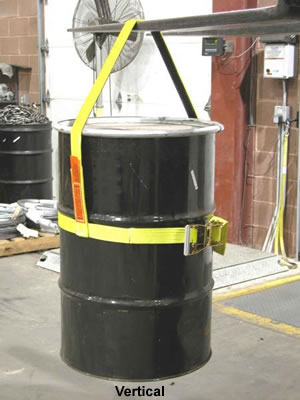 |
|
|
Easily
lift standing drums for transport. Tilt suspended
drums to pour from open top or spigot. For use with
ribbed steel drums, the ratcheting belly band tightens
securely below the first rib. |
|
|
|
Heavyweight
sling (DSV602D) uses 2" polyester sling
webbing and is rated at 850 lbs. |
|
|
|
| Promotes
Safety |
|
|
|
• A wear pad, sewn on one side of the lifting strap, helps to
avoid cutting of the sling.
• Ratchet tightens securely. |
|
|
|
| Saves
Time |
|
|
|
• Free end of ratchet strap sewn to stay properly threaded.
•Vertical
legs sewn to belly band to maintain proper position. |
|
|
|
To
Order, specify Part No. and drum diameter in inches. i.e.:
DSV602Dx24
(The standard 55 gal. drum has a 24" diameter.) |
|
|
|
|
|
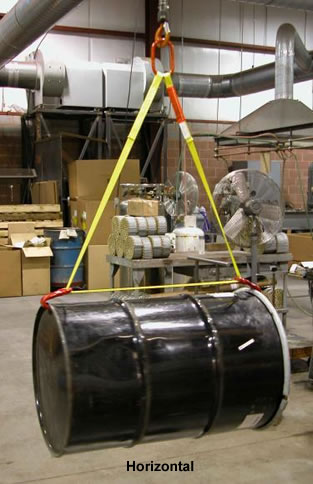 |
|
Horizontal
Drum Handling Slings |
|
|
|
|
|
Ideal
for the quick and easy moving of steel drums
in the horizontal position. |
|
|
|
|
|
Part
No. DSH601D uses 1" polyester sling webbing
and is rated at 1,500 lbs. |
|
|
|
|
|
Promotes Safety |
|
|
|
|
|
|
|
• Strong 1" polyester webbing pulls drum hooks securely into
rims at both ends of the drum during lift. |
|
|
|
|
|
Saves Time |
|
|
|
|
|
|
|
• One sling fits multiple size drums.
• Easy to disconnect.
• Uses 1/2" oblong link at
top for easy connection to hoist hook. |
|
|
|
|
|
To
Order, specify Part No. DSH601D. |
|
|
|
|
|
Note: If using in a chemical environment,
contact us for sling material advice. |
|
|
|
|
|
|
|
 |
|
Order
Online, by Phone, or by E-Mail |
|
|
|
~ Add
items to your online shopping cart ~
Click a Price of the item you wish to purchase. |
|
|
|
PRICING |
| Drum Handling Slings Vertical |
| Model
No. |
Drum
Dia. |
Price |
| DSV602Dx24 |
24" |
|
| DSV602Dx30 |
30" |
|
| DSV602Dx36 |
36" |
|
| Drum Handling Sling Horizontal |
| DSH601D |
- |
$207.65 |
|
|
| Effect
of Angle of Lift on a Sling's Rated Capacity |
|
|
|
|
|
|
|
|
DEFINITION |
|
|
|
|
|
|
|
|
serves
to alert users to potentially hazardous situations which often occur in
the use of these products.
Failure to read, understand and follow the accompanying instructions on
how to avoid these situations
could result in death or serious injury. |
 |
|
|
|
|
Using
slings at an angle can become deadly if that angle is not taken into consideration
when selecting the sling to
be used. The tension on each leg of the sling is increased as the angle
of lift, from horizontal, decreases. It is most
desirable for a sling to have a larger angle of lift, approaching 90°.
Lifts with angles of less than 30° from horizontal
are not recommended. If you can measure the angle of lift or the length
and height of the sling as rigged, you can
determine the properly rated sling for your lift. |
|
|
|
|
|
|
|
|
|
|
|
|
|
|
|
|
What
would be the rating of each sling
rigged at this angle? |
|
|
 |
|
 |
|
What
capacity sling do I need? |
|
|
|
|
|
|
|
|
|
|
|
|
|
1.
Determine the weight that the sling
will be lifting [LW]. |
|
|
|
|
|
|
|
| 1.
Calculate the Reduction Factor [RF]. |
|
|
|
|
|
|
|
|
|
|
|
|
|
|
|
|
|
a.
Using the angle from horizontal,
read across the Angle Chart to the
corresponding number of the
Reduction Factor column. |
|
|
|
|
2.
Calculate the Tension Factor [TF]. |
|
|
|
|
|
|
|
|
|
|
|
|
|
|
|
|
|
a.
Using the angle from horizontal,
read across the angle chart to the
corresponding number of Tension
Factor column. |
|
|
|
|
|
|
|
|
|
|
-OR- |
|
|
|
|
|
|
|
|
|
|
|
|
|
|
|
|
|
b.
Divide sling height* [H] by sling
length* [L]. |
|
|
|
|
|
|
|
|
|
|
|
|
|
|
|
|
-OR- |
|
|
|
|
|
|
|
|
|
|
|
|
|
|
|
|
|
b.
Divide sling height* [H] by sling
length* [L]. |
|
|
|
|
|
Choker
Hitch |
|
Vertical
Hitch |
|
2.
Reduction Factor [RF] x the sling's
rated capacity for the type hitch that
will be used = Sling's Reduced Rating. |
|
|
|
|
|
|
|
|
|
|
|
|
|
|
|
|
|
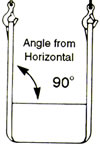 |
|
|
|
|
|
|
|
|
|
|
|
|
|
|
|
|
|
|
|
3.
Lifting Weight [LW] x the Tension
Factor [TF] = Minimum Sling Rating
for the type of hitch that will be used. |
|
|
|
Vertical
Basket
Hitch |
|
|
*Measured
from a common horizontal plane to
the hoisting hook. |
|
|
|
|
|
|
|
|
|
|
|
|
|
*Measured
from a common horizontal
plane to the hoisting hook. |
|
|
|
|
|
|
|
|
|
|
|
|
|
|
|
|
|
|
|
|
|
|
|
|
|
|
|
|
|
|
Reduced
Capacity |
|
|
|
|
|
|
|
|
|
|
|
Effect
of Angle Chart |
|
Increasing
Tension |
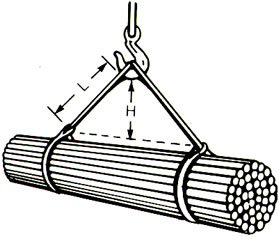 |
|
|
|
Reduction
Factor |
Angle
From
Horizontal |
Tension
Factor
(TF) |
| 1.000 |
90° |
1.000 |
| 0.996 |
85° |
1.004 |
| 0.985 |
80° |
1.015 |
| 0.966 |
75° |
1.035 |
| 0.940 |
70° |
1.064 |
| 0.906 |
65° |
1.104 |
| 0.866 |
60° |
1.155 |
| 0.819 |
55° |
1.221 |
| 0.766 |
50° |
1.305 |
| 0.707 |
45° |
1.414 |
| 0.643 |
40° |
1.555 |
| 0.574 |
35° |
1.742 |
| 0.500 |
30° |
2.000 |
|
|
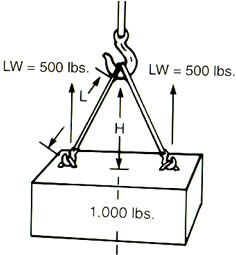 |
Example:
Vertical Choker rating of each sling = 6,000 lbs.
Measured Length (L) = 6 ft.
Measured Height (H) = 4 ft.
Reduction Factor (RF) = 4 (H) ÷ 6 (L) = .667
Reduced sling rating in this configuration = .667
(RF) x 6,000 lbs. = 4,000 lbs. of lifting capacity
per sling |
|
|
|
|
Example:
Load Weight = 1,000 lbs.
Rigging - 2 slings in vertical hitch
Lifting Weight (LW) per sling = 500 lbs.
Measured Length (L) = 10 ft.
Measured Height (H) = 5 ft.
Tension Factor (TF) = 10 (L) ÷ 5 (H) = 2.0
Minimum Vertical Rated Capacity required
for this lift = 500 (LW) x 2.0 (TF) = 1,000
lbs. per sling |
|
Sling
capacity decreases as the angle
from horizontal decrease. Sling angles
of less than 30° are not recommended. |
|
|
|
|
|
|
|
|
|
|
|
|
|
|
|
|
|
|
|
|
|
|
Drum Handling Sling, Webmaster
1600 Slings, Lifting Slings, Sling, Nylon Slings, Lift-All, Nylon and
Polyester Slings, Industrial Standard, Drum Sling, Heavy Duty Sling, Synthetic
Web Slings, Serial Numbered Identification, Triangles and Chokers, Eye
and
Eye Slings, Flat Eye, Twisted Eye, and Endless Slings from your source
for material handling equipment. |
Back
to Product Category |
 |
|








